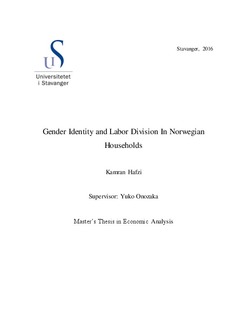| dc.contributor.author | Hafzi, Kamran | |
| dc.date.accessioned | 2016-09-30T08:22:42Z | |
| dc.date.available | 2016-09-30T08:22:42Z | |
| dc.date.issued | 2016-06-13 | |
| dc.identifier.uri | http://hdl.handle.net/11250/2412134 | |
| dc.description | Master's thesis in Economic analysis | nb_NO |
| dc.description.abstract | We investigate if gender identity has any effect on the division of household labor among Norwegian couples. By deriving the potential income distribution of the Norwegian population, we compare couples’ comparative advantage in market work. Our results indicate that women who have higher potential income than their spouse are more likely to increase their labor supply and work full-time, rather than reduce their hours allocated to market work in order to preserve gender identity. Contrary to specialization theory however, couples’ division of housework is not found to be affected by comparative advantage in our findings. Moreover, we find that the egalitarian division of household labor is dominated by the unstable division of labor, as Norwegian men are found to under-contribute to housework. In addition, our analysis indicates that women’s relative income has a diminishing effect on their happiness once their income exceeds the husband’s. We argue that this effect could be explained by the gender identity model. | nb_NO |
| dc.language.iso | eng | nb_NO |
| dc.publisher | University of Stavanger, Norway | nb_NO |
| dc.relation.ispartofseries | Masteroppgave/UIS-SV-HH/2016; | |
| dc.subject | økonomi | nb_NO |
| dc.subject | administrasjon | nb_NO |
| dc.subject | business | nb_NO |
| dc.subject | administration | nb_NO |
| dc.subject | labor division | nb_NO |
| dc.subject | gender identity | nb_NO |
| dc.subject | economic analysis | nb_NO |
| dc.subject | økonomisk analyse | nb_NO |
| dc.subject | kjønnsroller | nb_NO |
| dc.title | Gender Identity and Labor Division In Norwegian Households | nb_NO |
| dc.type | Master thesis | nb_NO |
| dc.subject.nsi | VDP::Social science: 200::Economics: 210::Economics: 212 | nb_NO |
